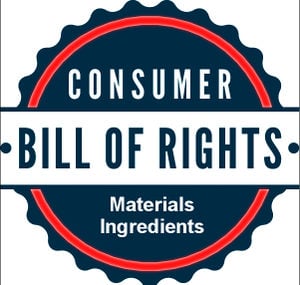Expanding the Consumer Bill of Rights for material ingredients

In President John F. Kennedy's original Consumer Bill of Rights speech to the United States Congress he called for the "right to be informed". At the time, materials science was in its infancy and only crude information technology was available, so the need for consumers to know what materials their products were made up of was outweighed by the difficulty of providing the information. Fifty-five years later the basic material ingredients are largely unknown for the vast majority of consumer products, making informed choices impossible. With the significant evolution in material science as well as information technology the ability to provide a materials ingredient list for every product is technically feasible, low-cost and straight forward. It is time for the Consumer Bill of Rights to be expanded to include digital access to a materials ingredient list. Freely accessible information about the material ingredients for all consumer goods would provide several advantages including: 1) creating new business opportunities for upselling products manufactured with superior materials, 2) improved consumer safety, 3) enabling socially responsible and ethical consumerism, 4) fostering advanced industrial as well as distributed recycling, and 5) expanding products to more valuable applications.
See also[edit | edit source]
- Open-source 3-D printing materials database generator
- Open Source Database and Website to Provide Free and Open Access to Inactive U.S. Patents in the Public Domain
- A novel approach to obviousness: An algorithm for identifying prior art concerning 3-D printing materials
- Polymer recycling codes for distributed manufacturing with 3-D printers
- Recyclebot
- Evaluation of Potential Fair Trade Standards for an Ethical 3-D Printing Filament
- Life cycle analysis of distributed recycling of post-consumer high density polyethylene for 3-D printing filament
- Life cycle analysis of distributed polymer recycling





